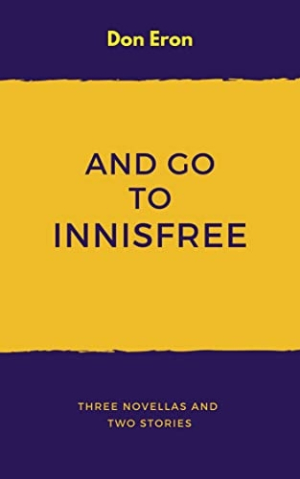And Go to Innisfree
Three Novellas and Two Stories
And Go to Innisfree is a collection of short stories about men who loved and lost.
Don Eron’s short story collection And Go to Innisfree catches its characters at pivotal moments in their lives.
In this collection: a greeting card writer finds an unexpected fame that he doesn’t feel he deserves. Another man reminisces about a girl who kissed him while he was staying at a friend’s house twenty years before. And a deli owner compares his life to that of an ancient Jewish shepherd-turned-scholar. Each of these men struggled to find love, and are now at a crossroads, forcing them to determine where they are in life, where they want to be, and how to bridge the gap between the two places.
There are five stories in the book, and each focuses on a moment when a woman (usually a love interest) made an impression on its hero—one that they never forgot, even when they thought they had moved on. In “Giselle’s Tears,” that moment comes during a high school wrestling match; in “Welcome to Gilgamesh,” it comes via a one-night stand with a writer who gifts the hero a book of poetry. Several of the characters are approaching middle age and realizing that their lives have not turned out the ways that they hoped. If they want to learn from their past experiences, many feel: now is the time to do so.
Functioning as character studies, the tales are driven by lengthy internal monologues that convey feelings of love, sincerity, alienation, and simple curiosity about others. As a result, though, their pacing is slow throughout. Long paragraphs linger over inner thoughts and conflicts, and there are instances of rambling that work to varying effect. Further, troubling moments arise: “Welcome to Gilgamesh” portrays mental illness in a negative, stereotypical way.
The book’s final story, “Misguided Missiles,” brings the collection full circle by revisiting people from the first story, “Giselle’s Tears.” The now-grown hero, who was once all but ignored by his older sister, copes with that sister’s terminal diagnosis. His tangled feelings over his impending loss lead to some of the most poignant and affecting passages in the book. But the story also excludes Giselle, raising questions about her absence.
The stories’ endings have a degree of ambiguity. There are no happy-ever-afters here: just men with memories that they must either let go of, or turn into inspiration for action. The extended monologues dig deep into the psyches of the characters as they’re caught between waxing nostalgic and deciding their futures.
And Go to Innisfree is a collection of short stories about men who loved and lost.
Reviewed by
Eileen Gonzalez
Disclosure: This article is not an endorsement, but a review. The publisher of this book provided free copies of the book and paid a small fee to have their book reviewed by a professional reviewer. Foreword Reviews and Clarion Reviews make no guarantee that the publisher will receive a positive review. Foreword Magazine, Inc. is disclosing this in accordance with the Federal Trade Commission’s 16 CFR, Part 255.

